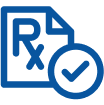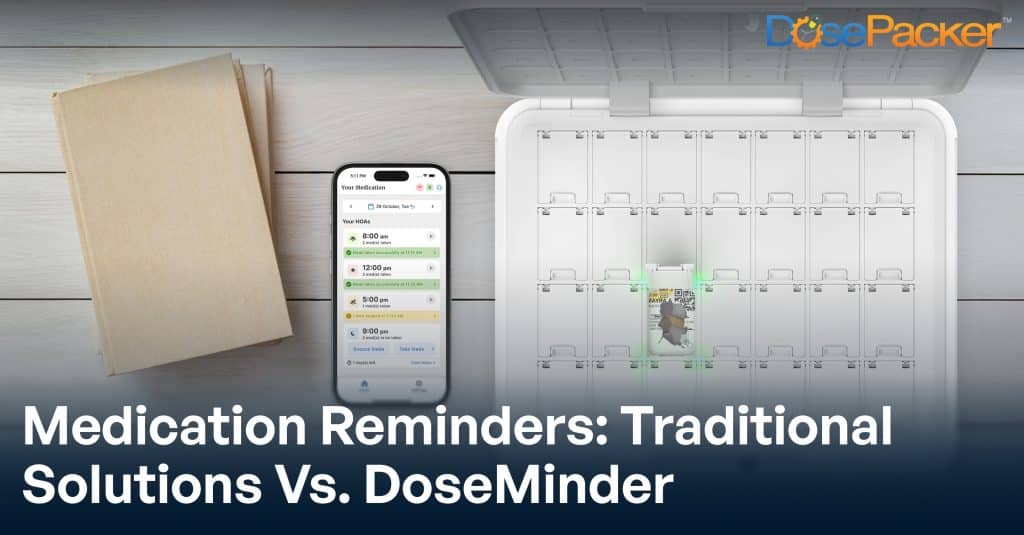Unlock the latest in medication management technology and grow your care community with us.

Starting a home healthcare business is more than building an agency. You’ll be creating a space where care and comfort are an integral part of people’s everyday lives at home, providing patients with the care they need in a setting where they feel safest.
The demand for home healthcare is growing quickly. With an aging population, an increase in chronic conditions, and families opting for in-home support over long-term facilities, this field offers both meaningful work and lasting opportunities.
At DosePacker, we recognize that one of the biggest challenges for new agencies is ensuring safe and reliable medication management. Our solutions make adherence simpler and compliance easier, allowing providers to focus on what matters most: delivering compassionate, high-quality care.
Launch a Successful Home Healthcare Business
Understand the Home Healthcare Industry
Before starting your home healthcare business, it’s essential to know what home healthcare really means. Unlike non-medical home care, which focuses on daily support like meal preparation or companionship, home healthcare provides medical services through licensed professionals. This distinction is essential because your licensing and reimbursement will depend on the type of care you choose to provide.
Common services in home healthcare include:
- Skilled nursing for wound care, IV therapy, or recovery
- Medication management and education
- Physical, occupational, or speech therapy
- Personal assistance with bathing, dressing, or meals
- Support for families and caregivers
Create a Solid Business Plan
If you’re exploring how to start a home healthcare business, one of the most important steps is creating a well-structured business plan. This plan serves as your roadmap, helping you stay focused and showing investors or partners that you’re prepared.
A strong business plan should cover the essentials:
- Target Market – Define who you’ll serve, such as seniors, post-surgery patients, or people with chronic conditions.
- Services – Decide if you’ll provide skilled medical care, non-medical support, or both.
- Pricing – Outline how you’ll charge, whether through private pay, insurance, or Medicare/Medicaid.
- Marketing and Growth – Plan how you’ll reach families, doctors, or hospitals through referrals, community outreach, or online marketing.
- Financial Projections – Estimate startup costs, payroll, and revenue for the first few years.
With a strong business plan, you’ll have the direction you need to move forward confidently and prepare for the licensing process ahead.
Meet Legal and Licensing Requirements
With your business plan ready, the next step is making sure your agency complies with the law. Regulations vary by state or country, so it’s essential to check what applies to you before opening your doors.
Some of the most important steps include:
- Licensing: Many states require a healthcare agency license or a home health license before you can open your doors.
- Accreditation: If you plan to accept Medicare or Medicaid patients, you’ll need certification and may choose to pursue accreditation from organizations such as The Joint Commission or CHAP to enhance your credibility.
- Business Registration: Decide whether to register your business as an LLC, corporation, or another structure. This protects you legally and helps with tax planning.
- Insurance: Liability insurance is a must to safeguard your agency, your staff, and the patients you serve.
- HIPAA Compliance: Patient privacy is non-negotiable. Ensure your systems and staff follow HIPAA guidelines to protect sensitive health information.
While it may feel like there’s a lot to do, tackling these steps one by one makes the process more manageable. Once you’ve built a strong legal foundation, you can focus on growing your home healthcare business and delivering exceptional care.
Secure Funding and Resources
Once you’ve handled licensing and compliance, it’s time to think about how you will fund your agency. Starting a home healthcare business requires upfront investment, and knowing what to expect helps you prepare with confidence.
Typical startup costs may include:
- Licensing and registration fees
- Staff salaries and training programs
- Medical equipment and supplies
- Technology such as scheduling or EHR software
- Marketing to build your presence in the community
When it comes to funding, you have several options:
- Personal Savings – Using your own funds offers flexibility but carries more risk.
- Business Loans – Banks and credit unions often provide healthcare-focused loans.
- Investors – Bringing in partners can ease financial pressure, but it also means sharing control and decision-making authority.
- Grants – Some states and organizations offer grants to support healthcare startups.
It’s also essential to allocate a portion of your budget for tools that will keep your agency running smoothly. Software for scheduling, billing, and medication management, along with compliance systems and ongoing staff training, are all investments that yield significant benefits in terms of efficiency and patient safety.
Set Up Systems and Processes
Strong processes not only make your home healthcare business operations more efficient but also give patients and families confidence in the care you provide.
A well-structured workflow should cover every stage of care, including:
- Intake – Collect patient details, medical history, and care needs.
- Scheduling – Match staff availability with patient visits to avoid gaps in care.
- Documentation – Keep accurate records for compliance, billing, and continuity of care.
- Care Delivery – Ensure every visit follows clear guidelines for safety and quality.
Medication management is one area where many agencies struggle, but it doesn’t have to be complicated. That’s where DosePacker makes a difference. Our solutions take the stress out of managing prescriptions through the solutions we offer:
- DoseMinder – A smart medication storage and reminder device that organizes medications and alerts patients when it’s time to take them.
- MyDoses App – Syncs with DoseMinder to provide reminders, track adherence, and deliver real-time updates to caregivers.
- Compliance Packaging – Organizes multiple prescriptions into easy-to-use medication packs, reducing errors and boosting adherence.
- Vial Packaging – Offers a straightforward and secure method for taking medications safely.
By implementing these tools, your agency can reduce caregiver workload, enhance patient safety, and foster trust with families. With reliable workflows and medication systems in place to support your staff, you’ll be well-equipped to deliver exceptional and compassionate care.
Create the Home Healthcare Agency Your Community Needs
Starting a Home Healthcare Business That Truly Cares
Launching a home healthcare business requires planning, compliance, and the right team to ensure its success. It may feel challenging at times, but with a clear plan and a strong commitment to quality care, your agency can grow into a trusted resource for patients and families in your community.
You don’t have to do it alone. DosePacker helps agencies succeed with safe, efficient medication management and compliance support. From organized packaging to smart technology tools, we make it easier for you and your team to deliver care that changes lives.
































